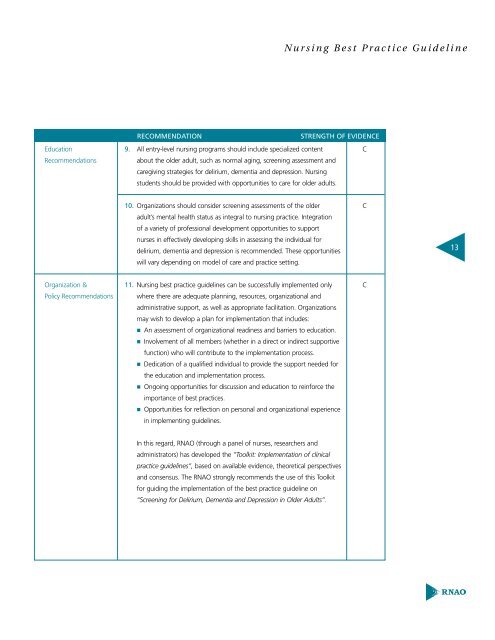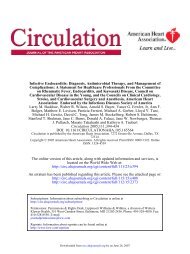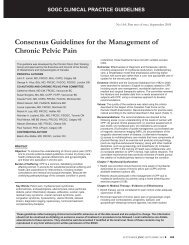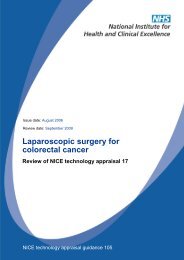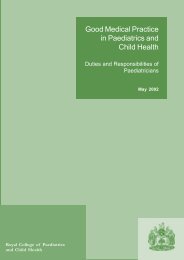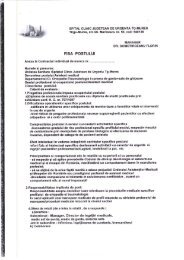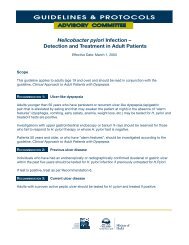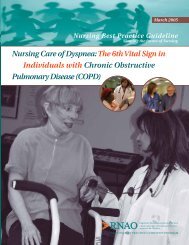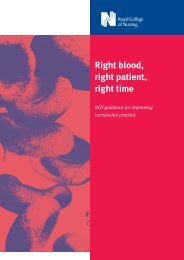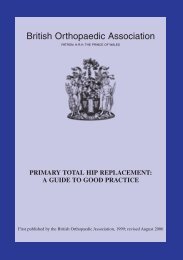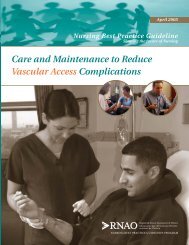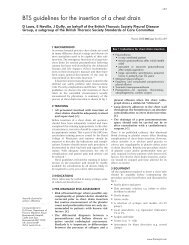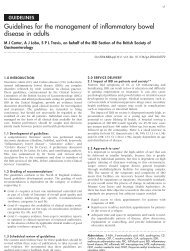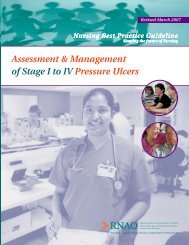Screening for Delirium, Dementia and Depression in Older Adults
Screening for Delirium, Dementia and Depression in Older Adults
Screening for Delirium, Dementia and Depression in Older Adults
- No tags were found...
You also want an ePaper? Increase the reach of your titles
YUMPU automatically turns print PDFs into web optimized ePapers that Google loves.
Nurs<strong>in</strong>g Best Practice Guidel<strong>in</strong>eRECOMMENDATIONSTRENGTH OF EVIDENCEEducation 9. All entry-level nurs<strong>in</strong>g programs should <strong>in</strong>clude specialized content CRecommendationsabout the older adult, such as normal ag<strong>in</strong>g, screen<strong>in</strong>g assessment <strong>and</strong>caregiv<strong>in</strong>g strategies <strong>for</strong> delirium, dementia <strong>and</strong> depression. Nurs<strong>in</strong>gstudents should be provided with opportunities to care <strong>for</strong> older adults.10. Organizations should consider screen<strong>in</strong>g assessments of the older Cadult’s mental health status as <strong>in</strong>tegral to nurs<strong>in</strong>g practice. Integrationof a variety of professional development opportunities to supportnurses <strong>in</strong> effectively develop<strong>in</strong>g skills <strong>in</strong> assess<strong>in</strong>g the <strong>in</strong>dividual <strong>for</strong>delirium, dementia <strong>and</strong> depression is recommended. These opportunitieswill vary depend<strong>in</strong>g on model of care <strong>and</strong> practice sett<strong>in</strong>g.13Organization & 11. Nurs<strong>in</strong>g best practice guidel<strong>in</strong>es can be successfully implemented only CPolicy Recommendations where there are adequate plann<strong>in</strong>g, resources, organizational <strong>and</strong>adm<strong>in</strong>istrative support, as well as appropriate facilitation. Organizationsmay wish to develop a plan <strong>for</strong> implementation that <strong>in</strong>cludes: An assessment of organizational read<strong>in</strong>ess <strong>and</strong> barriers to education. Involvement of all members (whether <strong>in</strong> a direct or <strong>in</strong>direct supportivefunction) who will contribute to the implementation process. Dedication of a qualified <strong>in</strong>dividual to provide the support needed <strong>for</strong>the education <strong>and</strong> implementation process. Ongo<strong>in</strong>g opportunities <strong>for</strong> discussion <strong>and</strong> education to re<strong>in</strong><strong>for</strong>ce theimportance of best practices. Opportunities <strong>for</strong> reflection on personal <strong>and</strong> organizational experience<strong>in</strong> implement<strong>in</strong>g guidel<strong>in</strong>es.In this regard, RNAO (through a panel of nurses, researchers <strong>and</strong>adm<strong>in</strong>istrators) has developed the “Toolkit: Implementation of cl<strong>in</strong>icalpractice guidel<strong>in</strong>es”, based on available evidence, theoretical perspectives<strong>and</strong> consensus. The RNAO strongly recommends the use of this Toolkit<strong>for</strong> guid<strong>in</strong>g the implementation of the best practice guidel<strong>in</strong>e on“<strong>Screen<strong>in</strong>g</strong> <strong>for</strong> <strong>Delirium</strong>, <strong>Dementia</strong> <strong>and</strong> <strong>Depression</strong> <strong>in</strong> <strong>Older</strong> <strong>Adults</strong>”.


